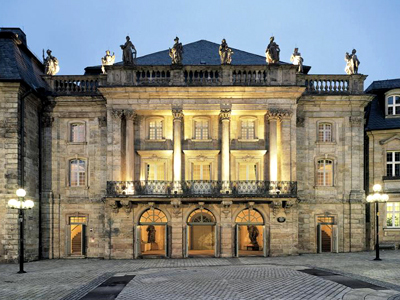
By ANDREW POWELL
Published: April 4, 2018
MUNICH — Bayreuth’s Rococo gem of a theater, the Markgräfliches Opernhaus, will reopen April 12 after a five-year, €32-million restoration. On the bill, fittingly: Hasse’s Artaserse (1730), as mounted by the Theater-Akademie August Everding.
Like virtually every public project in Germany these days, the effort took longer than expected and went over budget. Little or no funding came as a result of the building’s 2012 inscription as a UNESCO World Heritage “property” just before work began, leaving Bavarian taxpayers to foot essentially the whole tab.
Carlo Galli Bibiena created his sumptuous interior entirely in wood, with canvas, under the remote eye of his famous father Giuseppe. It sits within an urbane masonry shell by architect Joseph Saint-Pierre, all on orders from Wilhelmine of Prussia. The doors first opened in 1748 for stagings of Jommelli’s Ezio and the Hasse opera. Two years later, Saint-Pierre finished his façade.
The restorers progressed meticulously, from the ceiling down through the loges. Their mantra: “as bright and colorful as [when new].” Stage and proscenium have been remade in their 18th-century form, reversing Nazi-era structural changes. 4,500 bricks have been replaced.
Michael Hofstetter will conduct Artaserse, which transfers in May to the Theater-Akademie’s home here. Next Thursday’s premiere and attendant festivities will video-stream starting at 12:30 p.m. EDT at www.br.de [slash] franken. A tight-squeeze matinee concert May 1 by the Berlin Philharmonic, paying tribute to the Wagner town with the Wesendonck-Lieder, plus Beethoven, will likewise show online: 5 a.m. EDT at www.br-klassik.de [slash] concert.
Photo © Bayerische Schlösserverwaltung
Related posts:
St John Passion Streams
Bayreuth Parsifal Due Online
Time for Schwetzingen
Ministry Split, Minister Fired
Concert Hall Design Chosen
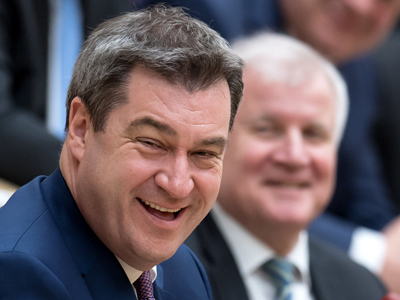

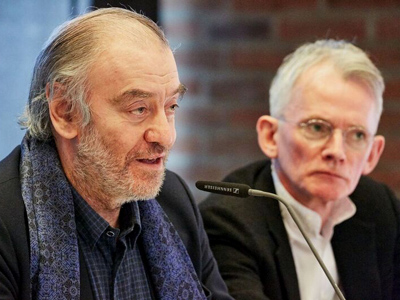
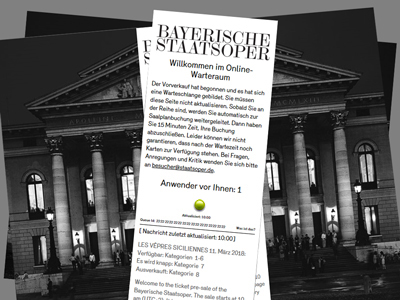

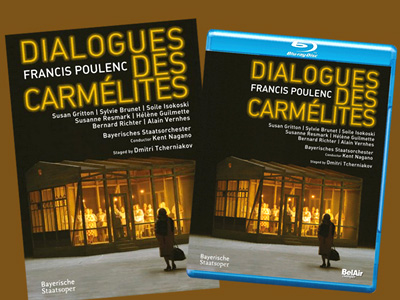
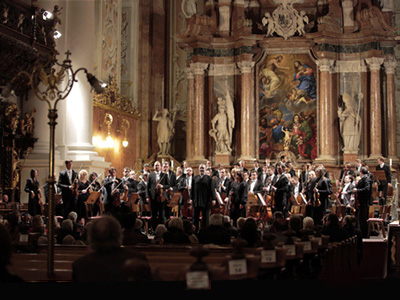

Five More Years
Wednesday, February 21st, 2018By ANDREW POWELL
Published: February 21, 2018
MUNICH — Putting box-office steadiness ahead of artistic achievement, the city council here voted this morning to extend by five years Valery Gergiev’s contract as Chefdirigent of the civically run Munich Philharmonic, as requested by the orchestra’s managers. The move doubles the Russian’s tenure, to encompass the seasons 2020–25. No salary was disclosed, as usual, but past reports have shown €800,000 as an annual figure.
Matthias Ambrosius, spokesman for the musicians, and clarinetist, noted in writing that the “vast majority” of MPhil players had wanted to lengthen the collaboration with Gergiev. Nonetheless it is widely understood that the managers’ request stemmed from a desire to ease dislocation of the orchestra in 2020, when a massive project to reconfigure its Gasteig home begins. Gergiev will in this sense be doing the city a favor, gamely cooperating for seasons at a temporary concert hall.
Photo © Landeshauptstadt München
Related posts:
MPhil Bosses Want Continuity
Bruckner’s First, Twice
Flitting Thru Prokofiev
Netrebko, Barcellona in Aida
Honeck Honors Strauss
Tags:Commentary, Gasteig, München, Münchner Philharmoniker, Munich, Munich Philharmonic, News, Valery Gergiev
Posted in Munich Times | Comments Closed